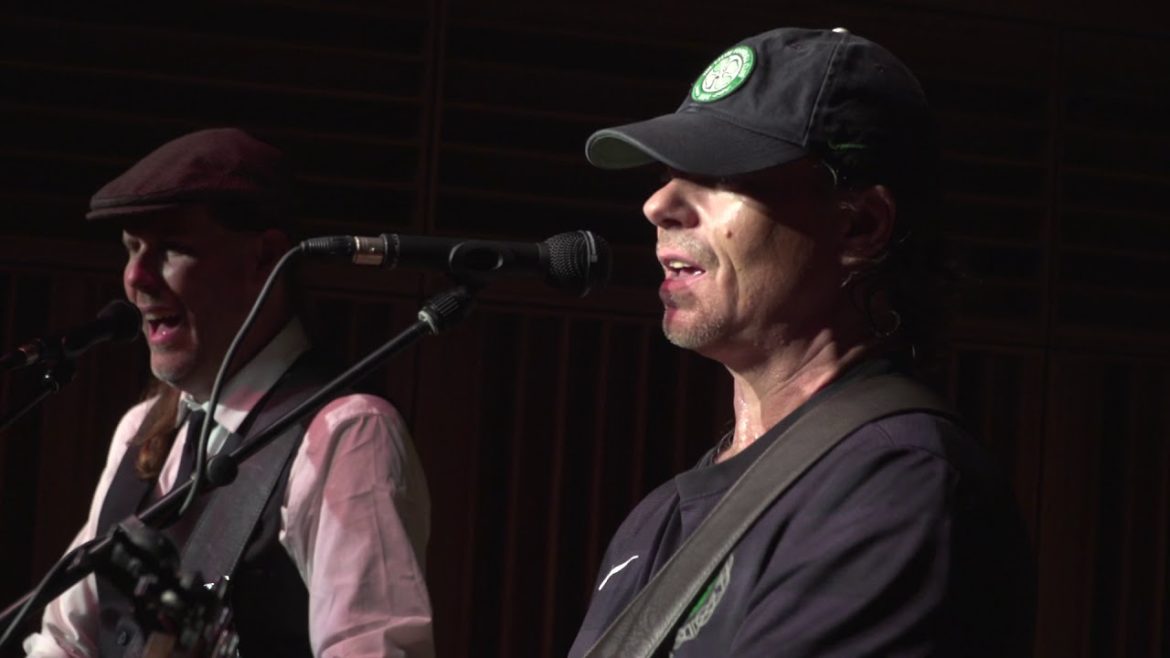NOTE: Tonight’s Alive @ Five has been cancelled.
The band Poehemia is settling in the lounge of Racers’ Cafe, a bar just outside the Baltimore city line. Racers’ is a neighborhood joint, complete with checkered linoleum and a blackboard of beers on tap, but the lounge is decidedly more upscale. It’s normally closed, explains lead singer Andy Anderson, but the guys are given special privileges because Anderson used to work there, years ago, as a cashier at the liquor store attached to the main bar.
It’s impossible not to have a drink when you’re sitting with Poehemia. For one thing, all its members — with the exception of drummer Greg Giannetti — are having one, and they’ll urge you to get one, too.
“We’re an Irish band. It’s what we have for breakfast,” Anderson will say. The four men are all in their late 40s, with the exception of Anderson, who is 50. Their age gives an edge of pragmatism to the idealism they all share as musicians.
Take, for instance, the following exchange, prompted by a line of questioning on why — and when — the band decided to start writing original music in addition to the Celtic and rock songs they generally cover.
“We’ve done that for a long time,” says Ted Koch, the band’s second singer and lead guitarist.
“For me, I’ve always aspired to write, to create, you know?” adds Anderson.
“The idea was that the cover band would help to support the original music,” Giannetti says. “I think just about everyone here can agree that this is the most profitable cover band we’ve ever been in.”
To wit: the men of Pohemia are motivated to write and perform their way to the top of the Celtic rock industry, a genre made most recognizable by Flogging Molly, the Dropkick Murphys, and, to a lesser extent, Ed Sheeran — an English musician who, nevertheless, was inspired to write his folk song “Nancy Mulligan” by his Irish paternal grandparents.
Still, they’re introducing the original material slowly. After all, Poehemia made about $40,000 in 2017 and played roughly 53 shows. Many of the band’s appearances — at Irish bars on St. Patrick’s Day, for example, or at Renaissance festivals — depend on its members’ ability to cleanly and expertly deliver popular Celtic songs.
All of which is fine. Good, even. Poehemia’s Irish folk covers are beautiful. Take the band’s rendition of “Galway Girl,” a song which, somewhat ironically, was written by the American folk musician Steve Earle, but became Ireland’s most popular downloaded song in 2008 after it was covered by native artists.
The song, a jaunty ballad about an ill-fated fling, is imbued with a dreamy quality when it’s sung by Anderson in his thick Scottish brogue. The band performs it with spirit. In the lounge at Racers’, Giannetti is set up with a cajón snare and box drum, a small wooden percussion set that still packs a mighty thump. Mike Kerr is on the bass — not a bass guitar, but the orchestral instrument, which has a mighty expanse that manages to dwarf his own tall frame.
Still, you can tell the men are proud, in a modest way, of their original songs. One of the newer ones is “Life of a Privateer,” a tune about a man named Thomas Boyle who moved to Baltimore to become a commissioned sea captain in the War of 1812. (The men are also proud of their shared connection to the city: Poehemia takes its name from famous resident Edgar Allan Poe and National Bohemian, the unofficial beer of Baltimore.)
“Boyle captured more ships than any other captain at the time,” says Koch, who also wrote the lyrics to the song. “It was his way of giving a big middle finger to the British.”
Even newer is “Taste” (working title), a song about the more elemental theme of human unity. Koch wrote the lyrics and is singing it live for the very first time in the lounge at Racers’; the song is so new that Kerr still needs sheet music to keep up. Still, it’s an indication of where the band could go in the future: a more experimental direction with remnants of Irish influence.
Koch and Anderson actually bonded over their mutual appreciation for alternative musicians, including progressive rock bands such as Genesis and Rush. Marco Reabe, a mutual friend who first introduced them, was slightly surprised the two musicians ended up forming a Celtic rock band.
“Part of the reason I thought they would click is because a lot of their interests were not so mainstream,” Reabe said. “They had these somewhat unique interests and they were both serious. They weren’t 20-somethings who just wanted to get drunk and hang out with girls.”
It was perhaps that very seriousness — and a fundamentally entrepreneurial approach — that encouraged the band to go Irish. Both Anderson and Koch grew up immersed in Celtic folk music and even Kerr claims Irish ancestry (Giannetti is the lone Italian, but a very quick learner, his bandmates said). They liked the songs they were playing, and it helped them stand out in the competitive universe of local cover bands.
“I believe that we can be big,” Anderson says. “Everything happens.”
It’s that belief that sustains the band’s rigorous touring schedule and 53 shows a year — performances in the sultry summer heat or the freezing cold on St. Patrick’s Day.
For Poehemia, the question isn’t if. It’s when.

